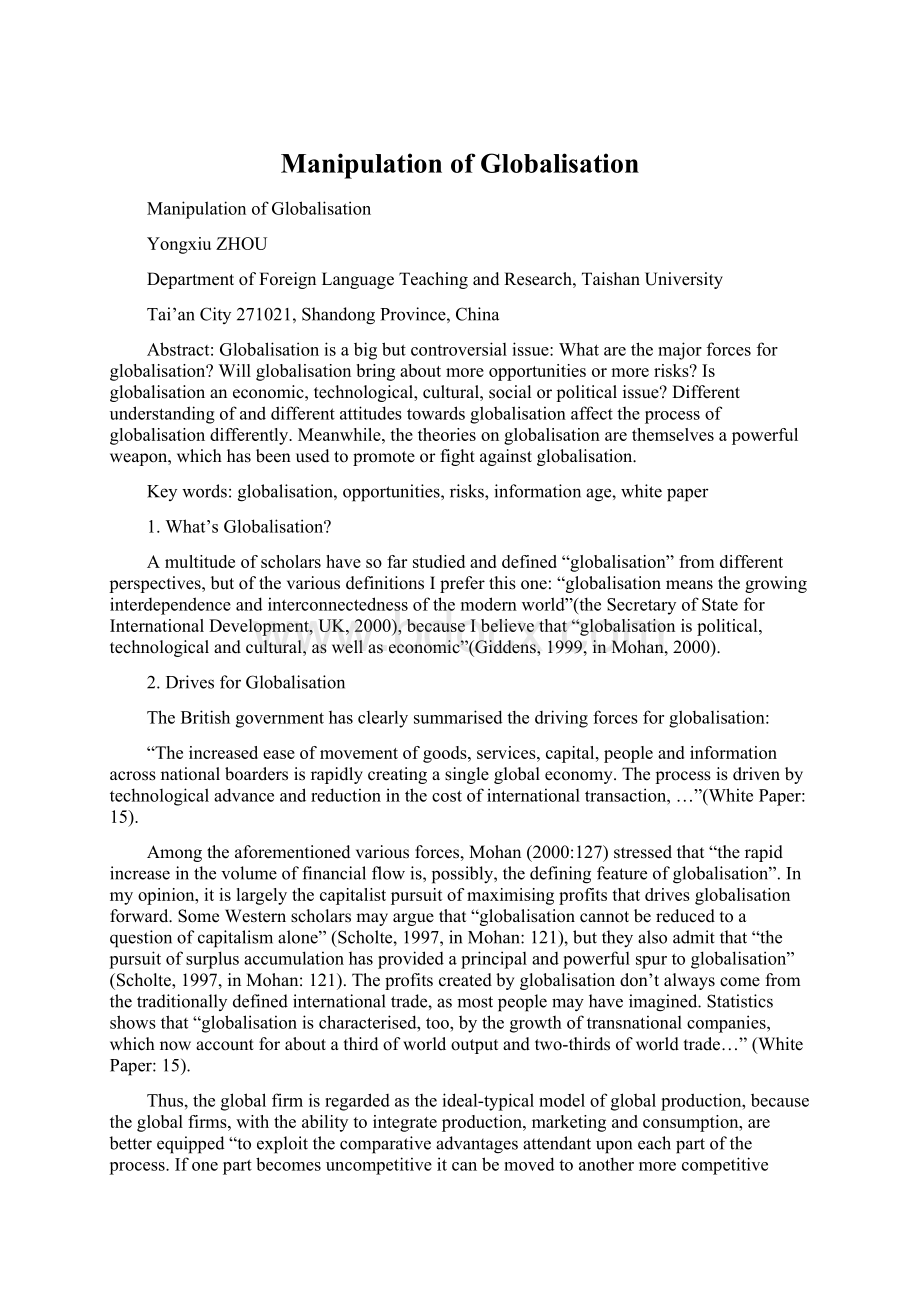Manipulation of GlobalisationWord文档格式.docx
《Manipulation of GlobalisationWord文档格式.docx》由会员分享,可在线阅读,更多相关《Manipulation of GlobalisationWord文档格式.docx(7页珍藏版)》请在冰豆网上搜索。

Whatarethemajorforcesforglobalisation?
Willglobalisationbringaboutmoreopportunitiesormorerisks?
Isglobalisationaneconomic,technological,cultural,socialorpoliticalissue?
Differentunderstandingofanddifferentattitudestowardsglobalisationaffecttheprocessofglobalisationdifferently.Meanwhile,thetheoriesonglobalisationarethemselvesapowerfulweapon,whichhasbeenusedtopromoteorfightagainstglobalisation.
Keywords:
globalisation,opportunities,risks,informationage,whitepaper
1.What’sGlobalisation?
Amultitudeofscholarshavesofarstudiedanddefined“globalisation”fromdifferentperspectives,butofthevariousdefinitionsIpreferthisone:
“globalisationmeansthegrowinginterdependenceandinterconnectednessofthemodernworld”(theSecretaryofStateforInternationalDevelopment,UK,2000),becauseIbelievethat“globalisationispolitical,technologicalandcultural,aswellaseconomic”(Giddens,1999,inMohan,2000).
2.DrivesforGlobalisation
TheBritishgovernmenthasclearlysummarisedthedrivingforcesforglobalisation:
“Theincreasedeaseofmovementofgoods,services,capital,peopleandinformationacrossnationalboardersisrapidlycreatingasingleglobaleconomy.Theprocessisdrivenbytechnologicaladvanceandreductioninthecostofinternationaltransaction,…”(WhitePaper:
15).
Amongtheaforementionedvariousforces,Mohan(2000:
127)stressedthat“therapidincreaseinthevolumeoffinancialflowis,possibly,thedefiningfeatureofglobalisation”.Inmyopinion,itislargelythecapitalistpursuitofmaximisingprofitsthatdrivesglobalisationforward.SomeWesternscholarsmayarguethat“globalisationcannotbereducedtoaquestionofcapitalismalone”(Scholte,1997,inMohan:
121),buttheyalsoadmitthat“thepursuitofsurplusaccumulationhasprovidedaprincipalandpowerfulspurtoglobalisation”(Scholte,1997,inMohan:
121).Theprofitscreatedbyglobalisationdon’talwayscomefromthetraditionallydefinedinternationaltrade,asmostpeoplemayhaveimagined.Statisticsshowsthat“globalisationischaracterised,too,bythegrowthoftransnationalcompanies,whichnowaccountforaboutathirdofworldoutputandtwo-thirdsofworldtrade…”(WhitePaper:
15).
Thus,theglobalfirmisregardedastheideal-typicalmodelofglobalproduction,becausetheglobalfirms,withtheabilitytointegrateproduction,marketingandconsumption,arebetterequipped“toexploitthecomparativeadvantagesattendantuponeachpartoftheprocess.Ifonepartbecomesuncompetitiveitcanbemovedtoanothermorecompetitivelocation.Suchintegrationallowstheparentcompanytoretaintheintellectualpropertyrights”(Mohan:
125).
Obviously,thisfunctionalintegration,whichfacilitatesintra-firmtrade,decides“profits,however,tendtogotothecountriesintheNorthwhereTNCshavetheirheadquarters”(Rigg:
36).Inaword,theeconomicforceisaverypowerfulincentivetoglobalisation.
3.TheWestandtheEast:
DifferentAttitudesTowardGlobalisation
Ofallthefactorsthataffectglobalisation,Ipersonallybelievethattheattitudesofnationalgovernmentstowardsglobalisationarecrucialtotheprocessofglobalisation.Ifagovernmentbelievesintheopportunitiescreatedbyglobalisation,itwillendeavourtopushglobalisationforward.Onthecontrary,ifagovernmentbelievesintheriskscreatedbyglobalisation,itwillbeeitherreluctanttoalignitselfwithglobalisationorberesistanttoglobalisation.Inthiscase,itisvitallynecessarytodiscussthedifferentconceptionsofglobalisationheldbydifferentcountries.
3.1Opportunities
It’suniversallyagreedthat“globalisationcreatesunprecedentednewopportunitiesandrisks”,inthetermsofTonyBlair(2000),buttheThirdWorld,onawhole,arguesthattheopportunitiesareexclusivelyfortherichcountrieswhiletherisksaremainlyforthepoorones.
Inthisrespect,theBritishgovernmentclaimsthat“itdependsonthepolicychoicesadoptedbygovernments,internationalinstitutions,theprivatesectorandthecivilsociety”(WhitePaper:
15),becauseif“managedwisely,thenewwealthbeingcreatedbyglobalisationcreatestheopportunitiestoliftmillionsoftheworld’spoorestpeopleoutofthepoverty.Managedbadlyanditcouldleadtotheirfurthermaginalisationandimpoverishment”(WhitePaper:
Thenwhataregoodpolicies?
AzizandWestcott(1997)arguedthatwhatmattersisthecomplementarityofwiththreeseparateelementsneededincombination:
“tradeopenness,macrostabilityandarelativelylowdegreeofgovernmentinvolvementineconomicactivity”(Mosley:
613).Asamatteroffact,“goodpolicytakesonadifferentmeaningineachdevelopingortransitionalcountrycontingentonitsstructure,itsstageofdevelopmentandtheexternalshocktowhichitissubject.Inparticular,policyresponsevariesbyregion”(Mosley:
614).TheBritishgovernmentconcludedthat“opennessisanecessary---thoughnotsufficient---conditionfornationalprosperity”(WhitePaper:
17).It’struethat,afterthedevelopingcountriesinsertedthemselvesintotheglobalmarket,they“haveseenasubstantialincreaseintheirtrade/GDPratios”(Kaplinsky:
119),butironically,atthesametime,“itsshareofglobaloutputfellmarkedly(Kaplinsky:
119).ThisphenomenonwastermedbyKaplinskyas“immiserisinggrowth”,describing“asituationwherethereisincreasingeconomicactivity(moreoutputandmoreemployment)butfallingeconomicreturns”(Kaplinsky:
120).
It’sundeniablethat“globalisationhasseenamassiveincreaseinglobalwealth”(Rigg,2001).ButtheThirdWorldcountriesareconcernedwithhowthewealthcreatedbytheglobalisationisdistributedamongcountries,andwhethertheglobalisationhasincreasedtheinequalitybetweencountries.Alsoironically,drawingonthesamefacts,therichcountriesandthepooroneshavecometooppositeconclusions.
TheBritishgovernment(2000)assertedthat“thebestevidencetodatesuggeststhatthere’snosystematicrelationshipbetweenopennessandinequality,orbetweengrowthandinequality”(WhitePaper:
15).Oneoftheirmajorevidencesisthatin1990theaveragerealincomeinthecountriescontainingtherichestfifthoftheworld’spopulationwas18timesgreaterthaninthecountriescontainingthepoorestfifth;
“bythelate1990s,thishasfallento15timesgreater”(WhitePaper:
Meanwhile,Rigg(2001),basedontheWorldDevelopmentIndicators(1999)releasedbytheWorldBank,argueswhileworldGDPgrewsharply,“therehasbeenawideninggapbetweenawealthyeliteofcountriesandamessofpoorcountries”(Rigg:
36).“Atthesametimeastheworldhasbecomericher,thenumberofpeoplelivinginpovertyhasincreased—toaround1.2billiononthebasisoftheWorld’sBank’sdefinition,whichisthoselivingonUS$1adayorless”(Rigg:
37).EvenaWTO-sponsoredreportpublishedin2000acknowledgedthefact:
“Whilethereisnosimplerelationshipbetweentradeandpoverty,theevidenceseemstoindicatethattradeliberalisationisgenerallyapositivecontributiontopovertyalleviation…”(Rigg:
37).ThisseemsstrikinglycontrarytotheBritishgovernment’sbelief:
“economicgrowthisanindispensablerequirementforpovertyreduction”(WhitePaper:
18).
Itisthewriter’sviewthattheaforesaiddiscoverybythepoorcountrieshas,infactthoughnotexpressed,causedthemtosuspectthattheWestseemstohavebeentryingtomaskthetruth,andmoreterribly,thiswillcausetheThirdWorldtosuspectwhateverconclusionstheFirstWorldwilldraw,atleastintermsofglobalisation.Thedifferentunderstandingofglobalisationisnotonlycausedbydifferentinternationalpoliticalideologies,butalsocausedbydifferentmethodologies.Forexample,employingdifferentstatisticalandanalyticmethods,wemaycometodifferentconclusionsaboutthesamephenomenon.Therefore,tolabeltheissueas“ideological”couldn’tputanendtothedebate.
Forinstance,intermsofthedifferentresultsofglobalisationachievedbytherichcountriesandthepoorones,theWesternpowersdeclaredthisdependson“initialcircumstancesandonthepoliciesthatgovernmentpursue”(WhitePaper:
35).Buttherealityisthattheinitialeconomicandtechnologicalcircumstancesinthepoorcountriesareabsolutelyinferiortothoseintherichcountries,whichmeansthatmostof(ifnotall)thepoorcountriesaredoomedtoimpoverishmentandmarginalisation,evenaftertheyhaveturnedtotheglobaleconomyatimmensecosts.Confrontedwiththisreality,theBritishgovernmentclaims“allprofoundeconomicandsocialchangeproduceswinnersandlosers”(WhitePaper:
18).AndaWTO-sponsoredreportechoed:
“Howevertradereformswillcreatesomelosers(someeveninthelongrun…)”(Rigg:
37).
3.2Risks
Nobodycoulddenythatglobalisationwillcreatesomeunprecedentedrisksandchallenges,asTonyBlair(1995)admits:
“Whatiscalledglobalisationischangingthenatureofthenation-stateaspowerbecomesmorediffuseandbordersmoreporous.Technologicalchangeisalreadyreducingthepowerandcapacityofgovernmenttocontrolitsdomesticeconomyfreefromexternalinfluence.”(Mohan:
121)
Butforthepoorcountries,therisksareevendevastatingsometimes,whichtherichcountriesdon’tseemtobothertotakeintofurtherconsideration.Anyway,Iwilltrymybesttosummarisethemajorriskssensedbythepoorcountriesasfollows:
PoliticallyGlobalisationrequiresafundamentaltra